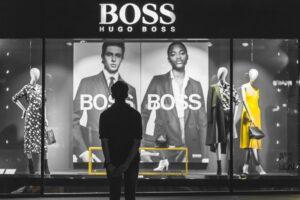Dividend freeze at Hugo Boss: the British owner reaches the peak of its influence
The British Frasers Group, the largest shareholder of Hugo Boss, announced that it does not support the German fashion company’s dividend payment plans. The share price shot up on the news, as investors interpreted the intervention as a positive signal in the long term.
No dividend, there is influence
 The Frasers Group, which is associated with British billionaire Mike Ashley, warned Hugo Boss that it would not vote on the proposal to pay a dividend. According to the reasoning, the company should prioritize financing long-term growth and financial flexibility – according to the statement on Thursday evening.
The Frasers Group, which is associated with British billionaire Mike Ashley, warned Hugo Boss that it would not vote on the proposal to pay a dividend. According to the reasoning, the company should prioritize financing long-term growth and financial flexibility – according to the statement on Thursday evening.
Frasers did not only criticize the payments: in their statement they also recommended that Hugo Boss withdraw its own shares, thereby increasing earnings per share and the potential for dividend payments in the long term.
Activist pressure on German fashion house grows
Frasers Group – which became known as the legal successor to Sports Direct – has emerged as an activist investor in a number of retail companies in recent years. It has also gradually increased its influence in Hugo Boss: it currently has a 25% direct ownership stake and a further 32% exposure through option structures.
The fact that Frasers CEO Michael Murray – Ashley’s son-in-law – recently joined Hugo Boss’s supervisory board can also be seen as a sign of strategic pressure.
Not just shareholders – business partners too
The relationship between the two companies is strong not only on an ownership but also on a commercial level: Frasers’ stores and online marketplace have been selling Hugo Boss products for years. The British company therefore has a strong interest in the success of the German brand not only as a financial investor but also as a strategic partner.
The reaction from shareholders was clear: Hugo Boss shares were up 4.2% on Friday afternoon, amid strong trading. The market therefore viewed Frasers’ intervention positively, which may aim to maximise shareholder value in the long term, even if it involves a short-term dividend cut.
Related news
Inditex: Zara group may close 100+ stores worldwide, focus on larger, more techy stores
🎧 Hallgasd a cikket: Lejátszás Szünet Folytatás Leállítás Nyelv: Auto…
Read more >Related news
József Viski: Adaptation and competitiveness are key for the horticultural sector
🎧 Hallgasd a cikket: Lejátszás Szünet Folytatás Leállítás Nyelv: Auto…
Read more >Festival buzz at the 60th anniversary EuroShop trade fair
🎧 Hallgasd a cikket: Lejátszás Szünet Folytatás Leállítás Nyelv: Auto…
Read more >







